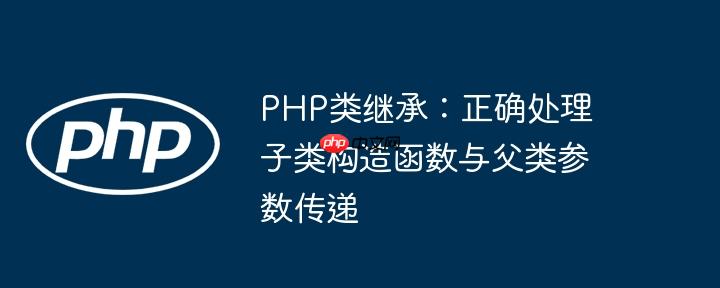
引言:PHP类继承与构造函数
在面向对象编程中,继承是一种强大的机制,允许子类复用父类的属性和方法。当子类需要扩展或修改父类的行为时,它可以重写(override)父类的方法,包括构造函数(__construct)。构造函数是类实例化时自动调用的特殊方法,用于初始化对象的属性或执行必要的设置。
然而,当子类定义了自己的构造函数时,它会覆盖父类的构造函数。这意味着,如果父类的构造函数中包含了重要的初始化逻辑(例如,初始化内部状态、设置依赖项等),而子类没有显式调用父类的构造函数,那么这些初始化逻辑将不会被执行,可能导致对象状态不完整或运行时错误。
理解 parent::__construct() 的作用
为了确保父类的初始化逻辑得以执行,子类在其自身的构造函数中需要显式调用 parent::__construct()。这个关键字允许子类访问并执行父类的构造函数。
考虑以下一个父类 DocumentProcessor,其构造函数需要一个 documentTemplate 参数来初始化文档处理过程:
tempDocumentFilename = tempnam(Settings::getTempDir(), 'PhpWord');
if (false === $this->tempDocumentFilename) {
throw new CreateTemporaryFileException();
}
// 模板文件克隆
if (false === copy($documentTemplate, $this->tempDocumentFilename)) {
throw new CopyFileException($documentTemplate, $this->tempDocumentFilename);
}
// 临时文档内容提取 (简化逻辑)
$this->zipClass = new ZipArchive();
$this->zipClass->open($this->tempDocumentFilename);
// ... 更多初始化逻辑 ...
echo "DocumentProcessor: 构造函数执行,模板文件 '{$documentTemplate}' 已处理。\n";
}
// 假设存在这些方法
protected function getHeaderName($index) { return "header{$index}.xml"; }
protected function getFooterName($index) { return "footer{$index}.xml"; }
protected function getMainPartName() { return "document.xml"; }
protected function getSettingsPartName() { return "settings.xml"; }
protected function getDocumentContentTypesName() { return "[Content_Types].xml"; }
protected function readPartWithRels($partName) { return "Content of {$partName}"; }
}核心问题:参数传递的缺失
当子类 TemplateProcessor 继承 DocumentProcessor 并尝试重写其构造函数时,一个常见的错误是忘记将父类构造函数所需的参数传递给 parent::__construct()。
立即学习“PHP免费学习笔记(深入)”;
考虑以下 错误示例:
getMessage() . "\n";
echo "错误发生在文件: " . $e->getFile() . " 行: " . $e->getLine() . "\n";
} catch (Exception $e) {
echo "捕获到其他异常: " . $e->getMessage() . "\n";
}
/*
预期错误输出(取决于PHP版本和严格程度):
捕获到错误: Too few arguments to function DocumentProcessor::__construct(), 0 passed in ... and exactly 1 expected
错误发生在文件: ...DocumentProcessor.php 行: ... (父类构造函数定义处)
*/上述代码会导致一个 TypeError 或 ArgumentCountError,因为 DocumentProcessor 的构造函数明确要求一个 $documentTemplate 参数,而 parent::__construct() 调用时却没有提供任何参数。
解决方案:正确传递参数
正确的做法是,在子类的构造函数中,将父类构造函数所需的参数,通过 parent::__construct() 调用时一并传递过去。
getMessage() . "\n"; } /* 预期输出: DocumentProcessor: 构造函数执行,模板文件 '/tmp/test_docXXXXXX' 已处理。 TemplateProcessor: 构造函数执行。 子类 TemplateProcessor 实例化成功。 */
在这个正确的示例中,TemplateProcessor 的构造函数接收 $documentTemplate,并将其原封不动地传递给了 parent::__construct()。这样,父类的初始化逻辑得以正确执行,DocumentProcessor 内部所需的 $documentTemplate 参数也得到了满足。
注意事项与最佳实践
始终检查父类构造函数签名: 在重写子类构造函数时,务必查阅父类构造函数的定义,了解它需要哪些参数、参数的类型以及默认值(如果有)。
参数顺序与类型匹配: 传递给 parent::__construct() 的参数必须与父类构造函数期望的参数在顺序、数量和类型上保持一致。PHP 7+ 对类型声明有严格要求,不匹配会导致 TypeError。
-
子类特有参数的处理: 如果子类构造函数除了父类所需的参数外,还需要额外的参数用于自身的初始化,应将这些参数添加到子类构造函数的签名中。通常,父类所需的参数会放在前面,然后是子类特有的参数。
class ChildClass extends ParentClass { public function __construct($parentArg1, $parentArg2, $childArg1) { parent::__construct($parentArg1, $parentArg2); // 先处理父类参数 // 子类特有的初始化逻辑,使用 $childArg1 $this->childProperty = $childArg1; } } 调用 parent::__construct() 的时机: 通常建议将 parent::__construct() 放在子类构造函数的第一行。这可以确保父类的初始化逻辑在子类进行任何进一步操作之前完成,避免子类逻辑依赖于尚未初始化的父类属性。
总结
在PHP中进行类继承时,正确处理子类构造函数与父类构造函数之间的关系至关重要。当子类定义了自己的构造函数时,务必显式调用 parent::__construct() 来执行父类的初始化逻辑。更重要的是,如果父类构造函数需要参数,子类在调用 parent::__construct() 时必须将这些参数正确传递过去。遵循这些实践可以确保继承体系的健壮性,避免因初始化不完整而导致的运行时错误,从而构建更稳定、可维护的应用程序。































